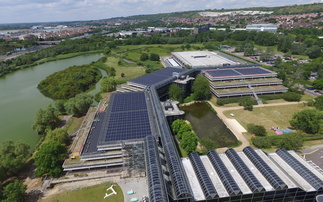Energy services company Anesco joins forces with wildlife charity to increase numbers of birds, bees and butterflies at its solar sites
Energy services firm Anesco has teamed up with wildlife charity the Royal Society for the Protection of Birds (RSPB) to encourage more wild animals to settle at its solar sites across the UK.
The new partnership, announced today, will see RSPB work with Anesco to develop a set of recommendations to ensure its solar farms offer the best environment to support some of the UK's most threatened bird, insect, and small animal species.
According to the RSPB, 60 per cent of UK species have declined over the past 50 years. Part of the project's aim will be to recreate habitats lost as a result of agricultural intensification, introducing vital new habitats for farmland birds such as turtle doves, tree sparrows, and lapwings, as well as bees, butterflies, and other insects.
Darren Moorcroft, head of species and habitats conservation at the RSPB, said solar farms have great potential to benefit UK wildlife.
"Over the next few years we will be working with Anesco to further improve the habitats created at their solar farm sites across the UK," he said in a statement. "It is an excellent opportunity to develop habitats for nature in need of our help, showcasing how a renewable energy business and wildlife conservation can be delivered in unison; whilst providing clean energy and sustainable development we can still continue to give nature a home."
Anesco, which works with companies to help them improve energy efficiency and cut carbon emissions, has installed more than 500MW of renewable energy capacity to date. Chief executive Adrian Pike said the new biodiversity project will help develop a model of best practice for others in the industry to follow.
"Thanks to this partnership, we will not only be continuing to create habitats at our sites in accordance with planning rules, but will be going far beyond this," he said in a statement. "We will be maximising the positive impact that our sites have for local wildlife, while focusing on supporting those species that really need it."
The partnership deepens RSPB's involvement with renewable energy, following the completion of the charity's own wind turbine at its headquarters in Bedfordshire. The turbine - which was approved after a three-year study into the wildlife impacts of its installation - is expected to generate more than half of the RSPB's annual electricity consumption.
The move also builds on solar industry efforts to turn solar farms into biodiversity or grazing hubs in response to criticism projects can eat into usable agricultural land or habitats.
A growing number of projects combine solar farms with grazing for livestock and hedgerow habitats for wildlife. Moreover, in 2014 industry body the Solar Trade Association (STA) published guidance on how to ensure solar projects can best enhance biodiversity in an area.









